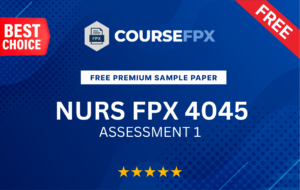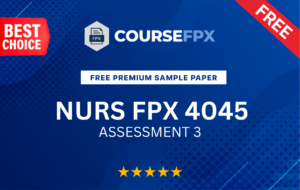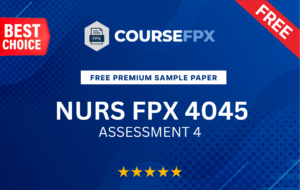NURS FPX 4045 Assessment 2
NURS FPX 4045 Assessment 2: Interprofessional Staff Update: Protecting PHI in ICU
The critical illness taking place in the ICU setting introduces a high potential of causing elevated emotional reactions by patients in a very serious condition and as such, patient privacy is a primary requisite. Social media offers the opportunity to express oneself but also a risk to the privacy of the patient, security and confidentiality. In NURS FPX 4045 Assessment 2, the dangers of non-compliant social media use are highlighted along with potential solutions to keep on the Confidentiality of Protected Health Information (PHI).
Protected Health Information (PHI), Privacy, Security, and Confidentiality
In NURS FPX 4045 Assessment 2, discussion revolves around PHI which includes information about the health status of a person, the use of medication, and the rest of the transactions regarding health services. HIPAA creates a guideline that covers how PHI is kept in a confidential manner to safeguard the privacy of the patient (Edemekong et al., 2022). Privacy implies that the patients have a right to their data. As an example, sharing a post on social media about how your time in the ICU was can leak protected health information without your consent. This shows security of electronic patient information since it is ensuring that the aforementioned protection is not breached or accessed by non-authorized individuals. As an example, sharing the progress of a patient on social media would result in the unintentional leakage of otherwise protected information that is prone to hack by cybergang members. Confidentiality refers to privacy of patient information, such that data about a patient is not given out without the consent of the patient. An example would be revelation of information concerning the condition of a patient to family members without the consent of the patient himself/herself or his/her family.
Patient privacy and confidentiality are issues that have been discussed by most literature in their relation to social media and are highlighted in NURS FPX 4045 Assessment 2. The most
remarkable topics raised here are the risks, ethical issues, and the best practices healthcare professionals should embrace. The study conducted by Ahmed et al. (2020) suggests that disclosure of the patient details can occur despite the absence of details about the patient due to the interlinking capabilities of the social media search engines. Moreover, NURS FPX 4045 Assessment 2
emphasizes posting pictures of patients on educational and training websites might exceed the targeted audience as these sites are not always confidential and it is hard to manage after the posting. Ethically, the crossing of professional boundaries is commonly described in social media as hindrances to developing healthy therapeutic relationships (Vuku Rukavina et al., 2021). As Vukušić Rukavina et al. (2021) show, inadequate social media posts that disclose protected health information negatively affect the image of a company and result in corrective measures, including termination of work and legal repercussions. The facility has social media policies to safeguard the privacy and confidentiality of patients as DOs and DON’Ts. The DON’Ts also includes posting photos of the patients without their consent, publishing false information, getting involved in internet battles, and displaying disparaging comments to the posts of patients. DOs includes general employment information, work related success and accomplishments, health tips (unrelated to the patient), and well wishes such as get well soon. Healthcare providers are also obligated to comply with HIPAA and state regulations on patient privacy regarding protected health information, and failure to do so may attract fines, lawsuits, and even criminal charges.
Importance of Interdisciplinary Collaboration
Multidisciplinary teams play an important role in ensuring the customized technological solutions are congruent with clinical workflow and to go with PHI provisions, which is highlighted in NURS FPX 4045 Assessment 2. This partnership role supports safe and user-friendly deployments of systems including EHRs and clinical decision support systems. As an example,
formulating a strong security protocol that could be utilized throughout our systems among IT team, legal professionals, security professionals, and nurse informaticists is illustrative of the importance of interdisciplinary collaboration in providing the most comprehensive security of patient information in the protection of electronic patient information. The world in the real world is taking the evidence-based approach on how to ensure these by establishing comprehensive social media policies and encrypt data in transit and at rest using secure communicative platforms such as Microsoft Teams or Signal to replace personal social media accounts to communicate about patient care. In addition, it is also necessary to determine and support strict data access depending on the role played by interdisciplinary team members, regular audit by the legal experts and nurse informaticists to identify the vulnerabilities and to take corrective measures, plan to respond to the incidents and conducting regular trainings (Pool et al., 2024). These plans indicate how the cooperation between departments can also develop a valuable system of securing ePHI, showing what protected health information includes. The intended social media post audience involves healthcare professionals as well as patients, organizations, and policymakers. The healthcare professionals include the members of the interdisciplinary team as they belong to the scope of electronic health information. On the contrary, patients should be informed that the organization is trying to keep their sensitive data secure so that they develop this trust (Bridges et al., 2021). The policymakers are governments and regulators that help in keeping the protection of health information current. Sensitive protected health information protection requires proper collaboration among all the disciplines of healthcare. Such practices as open communication and training can help us increase our ability to maintain the privacy of patients and ensure compliance with HIPAA requirements, as highlighted in NURS FPX 4045 Assessment 2.
Social Media Risks in ICU and Steps to Take if a Breach Occurs
Accidental conversation through the social media posts on working in the ICU may give away sensitive information of the patient (To, 2024). Breach of patient privacy and confidentiality is harmful to the reputation of medical institutions. Posting of sensitive protected health information on social forums has resulted in the termination of nurses, and sports organizations have either been seriously fined due to such legal breaches. When breach of unsecured ePHI is detected, the responsible reaction should be rapid and methodical. In the first instance notify the privacy officer or supervisor. Also eliminate any exposed writing so that other people cannot read more. Then, carry out an investigation to evaluate the scope of the breach, reasons behind the breach and remedial actions. Lastly, train employees, insist on privacy policies, and conduct specialized training to ensure future slip-ups are averted, encouraging a culture of personal responsibility and habitual upgrades, as emphasized in NURS FPX 4045 Assessment 2.
Evidence-Based Strategies to Mitigate Risks
HIPAA compliance, social media policies and secure ePHI handling are all mandatory training programs in most healthcare organizations. This cultivates the culture of continual training aimed at minimizing inadvertent breaches and instilling the notion of responsibility, emphasizing the types of data that protected health information includes. To exemplify, the investigation conducted by Gamor et al. (2023) found that quite regular training significantly increased the knowledge of social media risks and compliance with privacy policy by nurses. Hospitals have either implemented encrypted messaging applications (e.g., Signal) or internal communication software (e.g., Microsoft Teams) to supplant the use of personal social media accounts to discuss patient care. According to To (2024), secure platforms help to avoid unintentional leakage of information and the evasion of HIPAA violation. Taking into consideration the organizational policies governing the use of social media by restricting the exposure of any patient information to accessible personnel only when required at all times. One large healthcare organization has formulated a comprehensive social media policy, which directly prohibits sharing of patient
information, directly or indirectly on social media, as highlighted in NURS FPX 4045 Assessment 2. The policy prescribes how to use social media professionally and establishes sanctions when its rules are not followed. Barrett-Maitland and Lynch (2020) emphasize that clear policies reduce misunderstandings and provide useful standards to employees, to avoid infringements. Commit to continuous education about the ethical use of social media to our care environment, with reference to the vulnerabilities of our severely ill patients.
Nurse informaticists at one hospital in the Midwest prepared personnel to use EHR systems to process sensitive information securely and effectively. They held seminars on what to look out for to detect phishing attacks and other cybercrimes, including explanations of What is Protected Health Information. According to Booth et al. (2021), nurse informaticists were able to optimize data security and eliminate mistakes as they use technology. The allotted health facility in California undertakes a quarterly audit of the social media use and PHI access logs to scan possible vulnerability. The discrepancies are handled with further training and disciplinary measures. HIPAA requires frequent risk assessment to discover and seal loopholes in security systems (Allen, 2021). Use of the organization established reporting system that will be anonymous to raise any potential violations of confidentiality or misuse of social media. “One of the hospitals in Florida was able to establish a confidential reporting system where the employees could report to their supervisors or privacy officers in case they observed any potential breach, highlighting what protected health information includes. The system contains a hotline and online portal allowing employees to make anonymous reports. According to Allen (2021), immediate reporting and correction can reduce the effect of breaches and exert influence on their recurrence to a minimum, as emphasized in NURS FPX 4045 Assessment 2.
References
Ahmed, W., Jagsi, R., Gutheil, T. G., & Katz, M. S. (2020). Public disclosure on social media of identifiable patient information by health professionals: Content analysis of Twitter data. Journal of Medical Internet Research, 22(9), e19746. https://doi.org/10.2196/19746
Allen, A. L. (2021). HIPAA at 25 — A work in progress. New England Journal of Medicine, 384(23), 2169–2171. https://doi.org/10.1056/nejmp2100900
Barrett-Maitland, N., & Lynch, J. (2020). Social media, ethics, and the privacy paradox. Security and Privacy From a Legal, Ethical, and Technical Perspective. https://doi.org/10.5772/intechopen.90906
Bridges, C., Duenas, D. M., Lewis, H., Anderson, K., Opel, D. J., Wilfond, B. S., & Kraft, S. A. (2021). Patient perspectives on how to demonstrate respect: Implications for clinicians and healthcare organizations. PLOS ONE, 16(4), e0250999. https://doi.org/10.1371/journal.pone.0250999
Edemekong, P. F., Annamaraju, P., Afzal, M., & Haydel, M. J. (2022, February 3). Health Insurance Portability and Accountability Act – StatPearls – NCBI bookshelf. National Center for Biotechnology Information. https://www.ncbi.nlm.nih.gov/books/NBK500019/
NURS FPX 4045 Assessment 2
Gamor, N., Dzansi, G., Konlan, K. D., & Abdulai, E. (2023). Exploring social media adoption by nurses for nursing practice in rural Volta, Ghana. Nursing Open, 10(7), 4432-4441. https://doi.org/10.1002/nop2.1685
Pool, J., Akhlaghpour, S., Fatehi, F., & Burton-Jones, A. (2024). A systematic analysis of failures in protecting personal health data: A scoping review. International Journal of Information Management, 74, 102719. https://doi.org/10.1016/j.ijinfomgt.2023.102719




